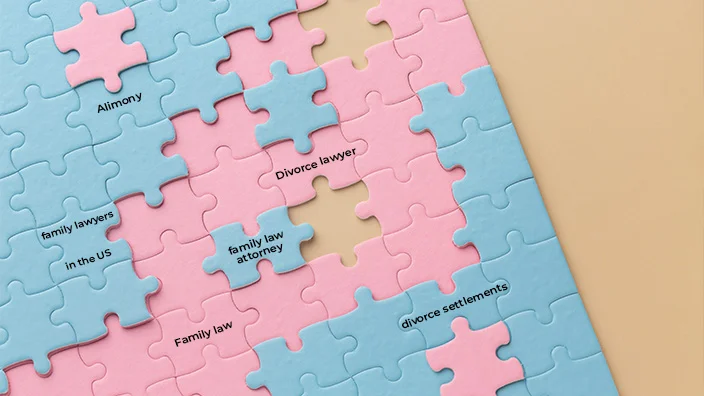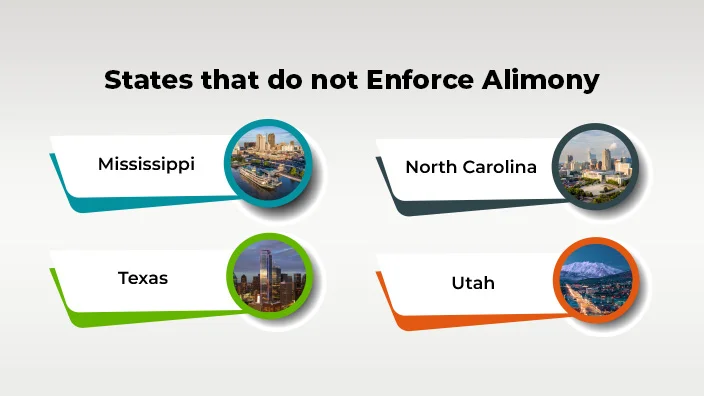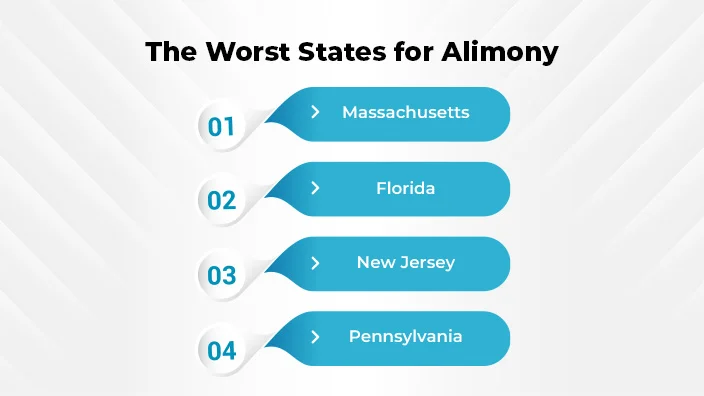People often come into relations and after spending some time with each other, they realize that they are not made for each other and split their ways.
The types of Alimony are discussed along with the situations in which a miserable spouse can legally claim help from the well-off partner. Go through the lines thoroughly and explore the intricacies of all the good and bad circumstances.
This article is particularly about the Alimony or financial support from the other well-off partner to another. What states do not enforce alimony is the core of this study. The study also extends to the states that allow alimony while those states which do not.
Table of Contents
- What is Alimony?
- Types of Alimony
- Supporting Spouse's Ability to Pay
- How Does Alimony Work?
- Best Interest of Children
- Difference Between Alimony and Child Support?
- Does My State Have Alimony?
- Getting Legal Help with Alimony
- Do All 50 States Enforce Alimony?
- What If I Can't Afford To Pay Alimony?
- Which States do not Enforce Alimony
- Worst States for Alimony?
- Conclusion
- Frequently Asked Questions
What is Alimony?
Alimony comes to the scene when one spouse needs some financial support from the other well-off partner after the agreement of marriage comes to an end.
Thus, it is a sort of “spousal maintenance payment”, sometimes considered as a part of a divorce settlement.
Types of Alimony
Alimony can be categorized into three types: -
Rehabilitative Alimony; in which the alimony is functional until the financial stability of the recipient spouse.
Durational Alimony; in which alimony is functional based on the time period or length of the marriage or, in most cases, half of the time period or duration of the marriage.
Permanent Alimony; is the support until the alimony receiving spouse is remarried or no longer alive.
Supporting Spouse's Ability to Pay
The entire case of alimony may revolve around the ability of spousal support. To claim alimony, the spouse must have sufficient income to get spousal support payments to the former spouse.
Thus, the case of alimony is based on the ability to pay spousal support or spouse to pay.
How Does Alimony Work?
The classical notion of alimony is that a husband must pay to his wife. However, the concept of paying alimony is not related to gender, rather it is the abundance and means that determine the direction of alimony.
If the couples were unable to negotiate through the crisis or were unable to resolve the issue, then the court would go for the state alimony enforcement under enforcing alimony regulations.

The state rules and regulations that affect spousal support payments include many forms which include but not limited to potential earning of spouses, lower earning spouse training, higher earning spouse ability to spousal support.
Length of the marriage, one paying spouse as a housekeeper or take care of the child and either divorce as, in the case of South Carolina, a “fault divorce or a no-fault divorce” are also some of the potential factors that determine how the alimony works.
Related Study: In Divorce How Are Assets Divided?
Best Interest of Children
Interest in children is also of prime importance while deciding upon other factors.
See, during divorce proceedings in the divorce court, if the custodial parent is not financially independent or unemployed, the family court or divorce court may take into consideration; the help of a well-off spouse for the maintenance payment by giving children under his/her care.
Difference Between Alimony and Child Support?
After the divorce decree from your spouse, if you have children and the family court decides via child support order that the children will live with your ex spouse, your financial assistance and contribution for raising the children’s standard of living is child support payments.
 On the other hand, to award alimony is “financial support for your ex-spouse” because of his/her less work experience and financial dependence on the well-off spouse throughout the marriage. Through alimony, you are bound to spousal support.
On the other hand, to award alimony is “financial support for your ex-spouse” because of his/her less work experience and financial dependence on the well-off spouse throughout the marriage. Through alimony, you are bound to spousal support.
Does My State Have Alimony?
Yes. Every state in the US has alimony. All of them have their own alimony laws.
However, they all are a bit different and diverge from one another in a number of rules. Some states made comprehensive alimony laws while others didn’t.
For instance, states that have, as mentioned, rehabilitative alimony rules pursue the well-off spouse to pay the ex spouse for a specific period until the former spouse finds a source of income.
If you are a citizen of Connecticut, Florida, New Jersey, North Carolina, Oregon, Vermont, and West Virginia then you have significant permanent alimony as the rest of the states do not have permanent alimony.
Getting Legal Help with Alimony
Though alimony can be a crucial source of permanent spousal support especially when one spouse is a lower earning spouse.
However, as an obligatory payment, it can be, sometimes, a burden on the supporting spouse.
 Thus, in order to strike a balanced agreement, after one spouse ends a marriage, whether “seeking alimony” or “avoiding alimony”, the best trajectory is to hire an experienced family law attorney.
Thus, in order to strike a balanced agreement, after one spouse ends a marriage, whether “seeking alimony” or “avoiding alimony”, the best trajectory is to hire an experienced family law attorney.
The family law attorney will put forward the demands in the best possible ways for stable outcomes and will drive the court decision in your favor.
Do All 50 States Enforce Alimony?
There is no state in the US having no alimony laws. However, in reality, the rules and implications differ from state to state. It doesn’t exist in strong stubborn form throughout the states.
In other words, some states have permanent alimony while others have temporary alimony. Further, you can’t decide a place for the case but you must file it in place of your residency.
What If I Can't Afford To Pay Alimony?
If your circumstances have altered from better to worse and you can’t meet your own needs, you can avail other options.
You can do a petition in court and ask for spouse payment to be stopped. The court system after examining the evidence will relieve you of your responsibilities.
However, the petition must convince the court that your conditions halt you from payment for the foreseeable future.
Otherwise, if your petition is because of temporal conditions, like underemployment, then the court won’t go for altering your alimony payments arrangement.
Which States do not Enforce Alimony
The most prominent states that do not support or are hard on alimony are: -

Mississippi
Mississippi law doesn’t have any predetermined or solid method for defining alimony laws.
Rather, it has situational law that is dependent on the situation in which the well-off spouse must have the means while the alimony recipient must have the basic reasonable needs for that.
Besides that, one lump sum of paying alimony and duration of alimony varies from individual to individual.
Texas
Strictest state in terms of granting alimony, Texas alimony rules only get functional and grant the alimony recipient spouse an alimony, if s/he provides enough information and convinces the court that s/he can’t meet his/her ends.
In Texas alimony is called “spousal maintenance” for which the state has strict criteria for awarding alimony.
For spousal maintenance payments there must be some conditions verified like marriage tenure to be at least 10 years but lack to earn sufficient.
Further, other conditions include the inability of the spouse to earn due to disabilities, the alimony awards seeker must be the custodian of the child due to disabilities of the other spouse, and if they were the “victim of family violence” in the marriage.
If verified, the court will grant alimony within definite limitations. The spousal support or spousal maintenance must not surpass $5,000 per month.
North Carolina
North Carolina support to pay alimony payments is a sort of conditional spousal support in the sense that granting alimony is mostly dependent upon the dependent spouse.
The court easily grants alimony to the financially dependent spouse.
However, if the dependent spouse within the marriage had extramarital affairs or marital misconduct, North Carolina’s courts have a “rebuttable presumption” against spousal support orders of alimony.
Utah
Marriage duration, good faith, and payment limit are the principles upon which Utah law determines the granting of alimony.
In light of Utah law, calculating alimony payments should not be more than the marriage duration and the alimony receiving spouse must have good faith in becoming self sufficient.
In addition, the alimony recipient payment must not exceed the payment needed for the basic survival needs.
Worst States for Alimony?
Alimony laws in certain states bring financial hardship for the spouses maintained to pay alimony. Following are the states categorized as the “worst” states for alimony.

Massachusetts
Having the highest alimony payment rate in comparison to other states, Massachusetts courts, in some cases, surpass the recipient ex-spouse's real expenses and put the payer in hot waters.
Florida
Florida courts and laws are unconcern with the situation of the payer whether s/he is bankrupt, underemployed, or unemployed.
Irrespective of the changing life circumstances and financial conditions, the payer must pay for the alimony for a lifetime making it hard for him/her.
New Jersey
Like Florida, the courts in New Jersey often make it obligatory for the spouse to pay for the rest of his/her life.
Unluckily, they also resist the change in or to end alimony payments after the party’s financial status is no longer stable.
Pennsylvania
Vagueness gets the best of Pennsylvanian alimony laws. Pennsylvanian courts are hard on alimony payments of payers because of their vagueness from case to case.
It is difficult for an ex-spouse as a payer to predict his/her financial obligations.
Conclusion
There is no state in the US having no alimony laws. However, in reality, the rules and implications differ from state to state. It doesn’t exist in strong stubborn form throughout the states.
Listen, in answer to the query “What states do not enforce alimony”; almost all states enforce alimony.
However, they differ in terms of their rules and their implications. Some states have built comprehensive rules for the alimony while counting on a number of factors.
Other states are rigid in their regulations and careless in their enforcement. However, cultural values, for instance, Texas treating alimony as the last option, also play an important role in the alimony laws.
Frequently Asked Questions
Do any states not have alimony?
Nearly every state imposes alimony or “spousal maintenance” but their laws vary from state to state. However, Texas, Mississippi, Utah, and North Carolina do not enforce alimony.
Does Texas enforce out of state alimony?
If the faith and credit are the same, Texas will enforce an out-of-state order. Texas court can change the previous amount. However, the method to receive alimony can vary as Texas laws count on the pre-wedding contract.
Is there alimony in Michigan?
Yes. The judge in Michigan can bestow you with alimony provided the condition that it would be a divorce. This is given on condition that one spouse earns more than the other spouse.


















